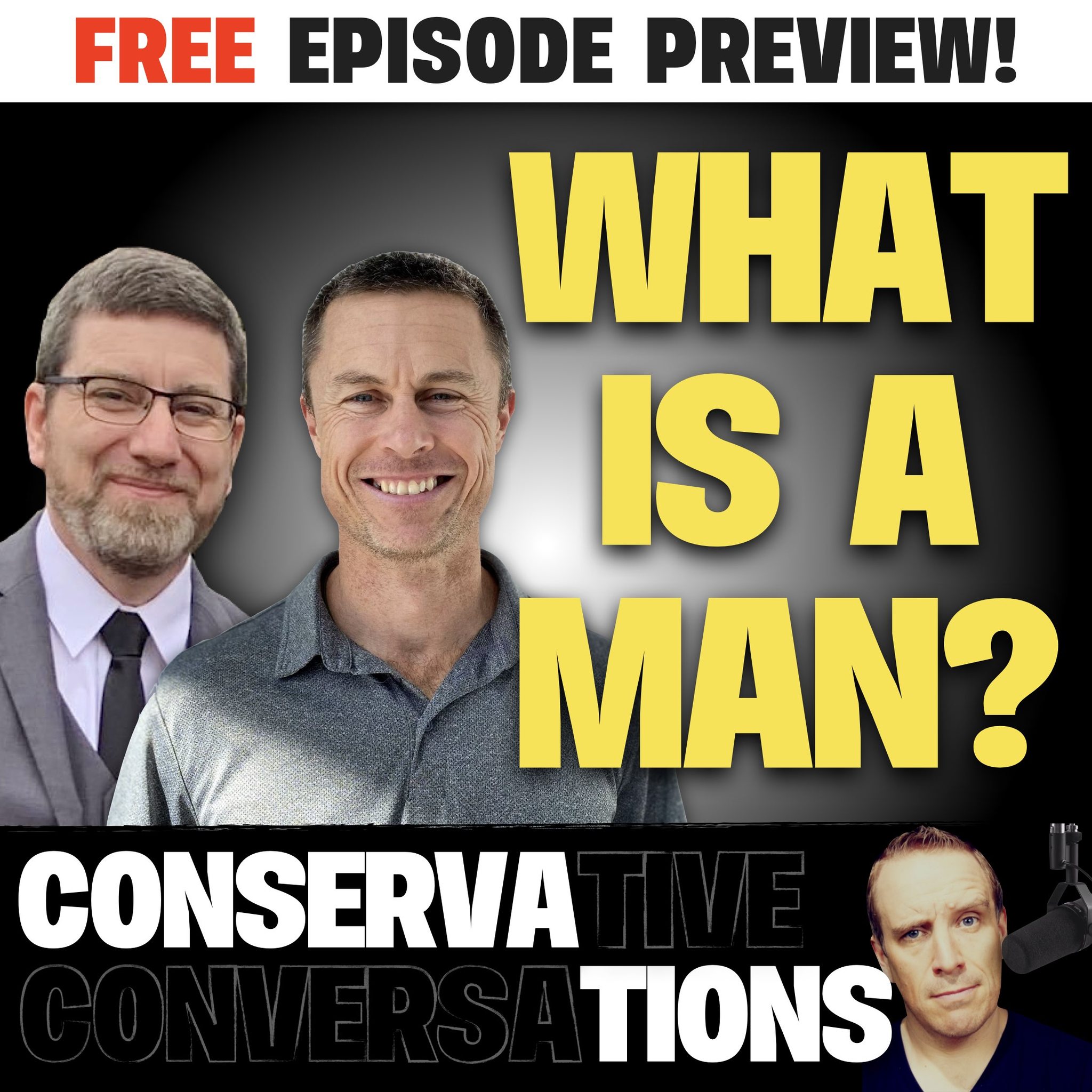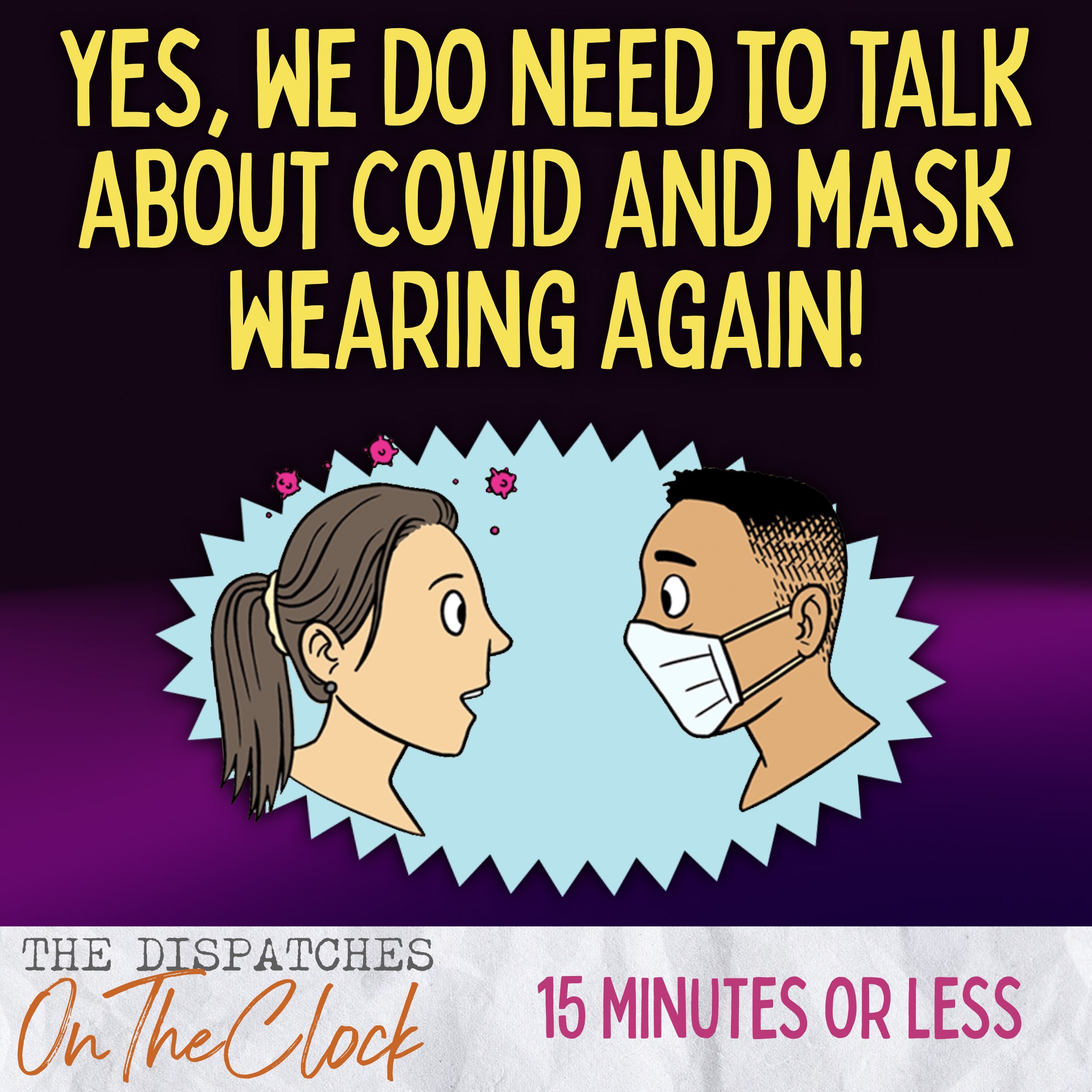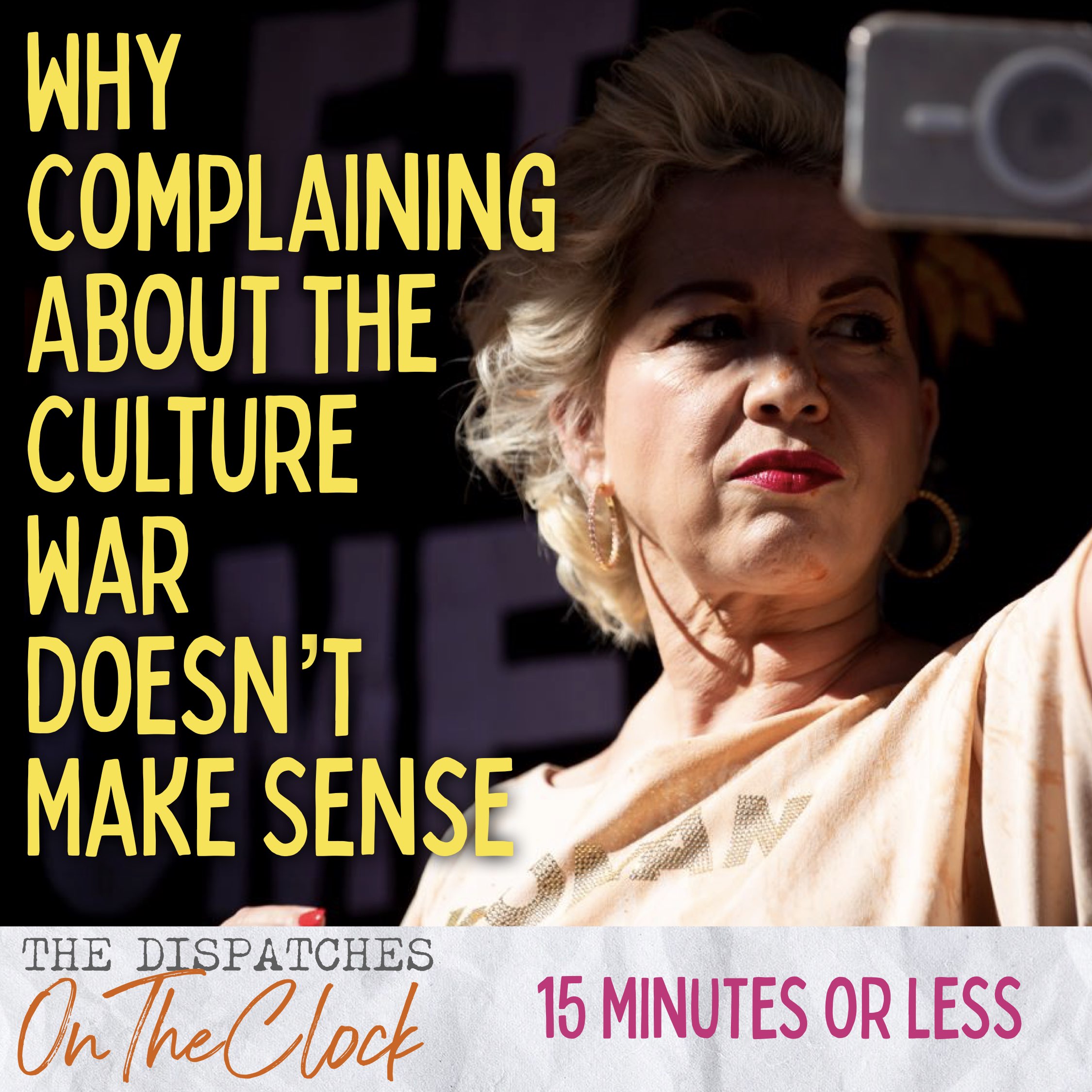[00:00:00] Speaker A: Ladies and gentlemen, start your stopwatches because you're listening to the dispatchers on the clock. And in this episode, you'll get to hear a special preview snippet from our brand new podcast show, Conservations. Conservations is a monthly interview show where we bring on guests to have an indepth discussion about a specific topic or to hear their personal story. You're about to hear a preview snippet from this month's show, but if you want to listen to the full 85 minutes episode, all you have to do is become a patron with $5 or more per
[email protected].
Left footmedia if you do that, not only will you get exclusive access to every single monthly episode of this brand new conservations interview show, but you'll also get exclusive access to our full length current affairs commentary podcast, the Dispatchers, every Monday and Wednesday. That's right, two exclusive patrons only commentary podcasts every single week. But wait, because there's more. You'll also get exclusive access to the audio only podcast version of our brand new monthly video show called Movies that Matter, which takes an in depth look at a different film each month and the major cultural, philosophical and religious themes that it contains. Now, anyone can watch the YouTube version of that show, but only our patrons get exclusive access to the audio only podcast version each month as well. And just in case that wasn't enough, as a patron, you'll also get early access to all of our written articles. That's usually five to seven days before we make them freely available to the public on our website. All of this awesome content for just $5 per
[email protected].
Left FootMedia that's right, the cost of a cup of coffee gets you more than 12 hours of new and exclusive left foot media content every single month. So what are you waiting for? Sign up
[email protected]. Left FootMedia the link is in today's show notes. In the meantime, please enjoy this preview snippet from our brand new monthly interview show, Conservations.
Welcome to ConservatioNS, the podcast, which got its name by literally combining the words conservative and conversations, which is exactly what happens on this show every month. Each episode we host a conversation with at least one other guest where we go in depth on a topic or hear about their experiences on this journey we all share together called life. The aim of this show is to foster and promote dialogue which cultivates goodness, truth and beauty, and in doing so, unpacks the richness of the authentic conservative tradition. My hope is that you'll find these conservative conversations intellectually engaging and enriching, and that they will draw you ever more deeply into an authentic, truly flourishing, and more meaningfully lived human experience. In this month's episode, we're going to be talking with Dr. Peter Holmes and Dean Muschewski about the topic of masculinity. Dean is a theologian and communicator from New Zealand. He is married to Julie and is the father of nine children. He works full time in management in the New Zealand electronics industry and he has a bachelor's degree in manufacturing engineering along with a master's degree in theology. He enjoys studying the intersection of Christian apologetics, church history, scripture, science and philosophy, and has been active as a communicator in the space for more than 25 years now. Dean is also an athlete. His sporting interests include Canoe Polo, where he represented New Zealand at two World Championships functional Fitness, where he has competed internationally as a master's athlete, powerlifting and historical European martial arts. Dr. Peter Holmes is a theologian and university lecturer from Australia. He is the married father of eight children and one grandchild. He has a Bachelor of Theology, a graduate Diploma of Ministry, a master's degree in theology, a graduate diploma in Theology specializing in marriage and family, and a PhD in theology of masculinity. He was trained and served as a Lutheran minister before working in counseling, consulting and teaching roles within the Catholic Archdiocese of Melbourne and Sydney. Since 2007, Peter has lectured in Scripture, theology and biblical languages. So without any further ado, let's have this month's profoundly important conservative conversation, which I have rather cheekily titled what Is a Man?
[00:04:34] Speaker B: You.
[00:04:47] Speaker C: Well, chaps, let's just jump straight into it, shall we? And I think a topic that really shouldn't be, but has become so controversial, probably because of politicization, I think primarily. But on the one side, I really have a great sense of trepidation, particularly for my son as he grows, and for a lot of young men trying to navigate the absolute, I don't know, the gauntlet of what is masculinity? What does it mean to be a man in the world? And it seems on one side you've got these sort of influences like, I guess, the old school, promiscuous male, get as many female trophies as you can and that's what makes you a man. Or the sort of perhaps thuggish type excesses, the barbarism of masculinity, or the macho sort of excess, if you like, the new phenomenon of incels, involuntary celibates. And they're very hostile, often the way they speak about females. It's kind of a real tragic nihilism and pessimism to it.
[00:05:42] Speaker A: And then on the flip side, you've.
[00:05:43] Speaker C: Got the men who feel like, almost like masculinity traitors. My masculinity is my original sin, and I'm sorry for every man in the world. And then on top of all of that, as if that wasn't enough, it feels like a lot of the men who have run the gauntlet our age and older. I feel lucky enough to have run the gauntlet already with a good dad, pretty simple kind of guy, and I'm married with kids of my own now. But a lot of those guys, for whatever reason, aren't they feel, like, silent? Maybe they're a bit embarrassed themselves. They don't know. Maybe they feel they should be sorry for their masculinity so they don't speak up as much. There's not much mentoring happening, and it just feels today that it's a heck of a challenge to be a bloke. Is that a fair assessment?
[00:06:22] Speaker D: I would Say so.
We'd like to think we're balanced. And everyone thinks they're the middle of the road. Absolutely.
[00:06:31] Speaker B: Whenever you ask someone, they are middle.
[00:06:32] Speaker D: Of the road, and everyone else, left or right of me, is extreme. But I've been kicked out of theological conferences because I am oppressing people before I've opened my mouth because I'm a male.
[00:06:45] Speaker C: So that actually happened to you?
[00:06:46] Speaker D: Oh, absolutely, yeah.
That's not the only conference I've been kicking before I said anything.
But yes, it happens. And there is it a presumption that it has to be said. Often it comes from a place of deep hurt, where someone's been hurt by a very poor example of masculinity.
And it also has to be said that even good men have failed to stand up against that and call it out and say, no, you may not treat women this way, you may not treat children this way. You can't be that kind of parent because we've had such a private focus on family in the Western world that we haven't really held each other accountable in the same way. Now, I can't speak to other cultures, but we have to admit that there's been a problem there. And when people are that hurt, of course they back off from men and we make this mistake. And I think it's a trick of the devil, actually, to pit two goods against each other and where one has, like, if I can take a step back and say that the solution for something being abused is not to get rid of it, but to do it right. So the solution to a bad father is train good fathers. The solution to infidelity is fidelity.
But it seems like everyone just wants to throw out everything that doesn't work. And it's true. The stereotypes you mentioned aren't stereotypes for a random reason. There's a lot of guys in my childhood when I grew up were living exactly that way, and we didn't call them out. And maybe it's time for us to make a stand on that and actually start holding ourselves to standards.
[00:08:29] Speaker B: Yeah.
If we've been blessed with good dads.
I mean, one of the things I realized sort of early in my parenting career was, man, I need to get in touch with my parents and say thank you. Right.
I didn't realize just the sheer commitment that was involved until you have to start doing it yourself. But also just reflecting what you've been saying there. And the example that I had from my dad without me realizing it, set me up on a less dangerous trajectory than a lot of people have sort of found themselves on, through no fault of their own. And it's only later that I've come to realize that. But I definitely agree. If you take all the elements of wrongness that Brendan was enumerating before, if you take them all away, there's nothing left.
So it's like you're saying, Peter. Yes, very much so. The answer to the problems is just undo the problems.
I think most people have a vision of what good. I was going to say good manhood, but I think fatherhood is to drill down, is the key to it. Right. Most people have an ideal or some sort of mental picture of a great dad.
[00:09:33] Speaker C: Well, is that a factor then?
I think fatherhood is essential. It's a very civilizing agent, marriage and really having kids. Civilizing agent. The most effective, ordinary means of civilizing a man is to make him a father of children.
[00:09:47] Speaker B: Yeah. And civilized the man. You civilize the culture.
[00:09:49] Speaker C: Now the question is then, has the loss of fatherhood, the fact that a lot of men aren't getting married. There's a lot of promiscuity, there's a lot less children being born in the world. Is that a factor then when we think about. We've got more single men who just sort of don't know what to do with themselves if you keep being single.
[00:10:03] Speaker D: Yeah, I'd say that's definitely a problem. But I think that part of the problem began before that. There are a lot of men in the position of fatherhood who didn't actually father.
There's a lot of absent fathers, we call them now, or even just emotionally absent fathers.
[00:10:18] Speaker B: Yeah, there's physically present, but not really. Exactly.
[00:10:21] Speaker D: And there was a culture of driven men who were taught even by churches, that the way you're a good father is that you work till you die and provide money for your family kind of thing, or a good home or something. And we didn't emphasize the other, the relational elements of it and the moral education and the good example. And so young kids grew up and it wasn't such a big deal when they were surrounded by other men and the church teach them and everything. But now the social media and movies know you can't learn masculinity from John Wayne or Bruce Willis or. I'm trying to think of.
[00:10:55] Speaker B: You're dating yourself.
[00:10:56] Speaker D: Yeah, I am.
[00:10:57] Speaker B: I was thinking the same people. We are dating ourselves. But no, you can't. Hollywood as a whole, I mean, their objective is not to help people get to heaven. Right. Their objective is to sell beer and shampoo or whatever.
[00:11:09] Speaker D: Yes.
[00:11:09] Speaker B: Right.
And with perhaps some other smuggling, some other ideologies while they're at it, actually, maybe their ideal is not to sell beer and shampoo because they've been doing a lot of stuff lately that is not appealing to anyone. Go woke. Go broke.
[00:11:25] Speaker D: Well, I'm going to push back on you a little bit there. So I think that our whole system, a capitalist system, means that everything's about the money because the people invest, they don't care about anything except getting more money back. Right. But someone has convinced them that woke things make money. And what I'm hoping that they're doing right now is realizing, actually this stuff doesn't sell.
You watch some movies like the fact that, for example, Mavericks, just blowing box office records out of the way. And it's about as cliche as you can get from the old school movies. Thoroughly enjoyable, by the.
Yeah, it was.
I think they're slowly learning. They did the same, by the way, with the passion. They said to Mel Gibson he was never going to sell, that it's never going to get anywhere. And when it blitzed, a wave of kind of semi religious movies came out trying to get into the market. But unless you're there, unless you're real, it doesn't work.
[00:12:21] Speaker C: Well, I think it's interesting. Even the latest Avatar movie, Avatar Two, a lot of reviewers have said it's actually quite refreshing because it's a strong father led family. He's trying to keep his family safe. These little blue aliens of course, and there's lots of cheesiness, but a lot of people said that was actually quite a positive distinction. They.
[00:12:42] Speaker A: Of.
[00:12:42] Speaker C: Because you mentioned John Wayne and Bruce Willis. I don't know if I'd put those two on a par. But I wonder if there's a balance here in a sense. I remember my life. My father was a big fan of the Western and I have developed that sort of love of Westerns myself. And I know a lot of modern commentators have sort of critiqued the John Wayne image of masculinity.
[00:13:04] Speaker B: But toxic masculinity.
[00:13:05] Speaker C: Yeah, I feel like there's a bit of a balance there. You don't want to be a man who doesn't know how to understand his interior life and express that when it needs to be. But there is also a certain.
Well, as men, we just got to get on with protecting, nurturing, doing the hard business for our families. There's almost like a balance. And I feel like we're throwing it all out of kilter.
[00:13:26] Speaker D: Yeah, we're getting a little bit into this is not anything to do with my studies. I think that some movies sell because deep down in all of the men there's still that little boy who thinks when he's looking at know, if the super spy thing happened, I reckon I could handle myself. And you want to feel like you could be that hero. And I think in part, I mean, as you said, Dylan, Wayne's got some toxic stuff attached to him, especially the way he deals with women in his movies. Yeah, that's right. But having said that, we've almost lost the good guys bad guys genre and we're not even thinking of ourselves as potential good guys anymore. And that's actually a bit of a tragedy. So Bruce Wellis is this broken down, like, he plays this sort of stereotypical, broken down, completely wrecked person.
[00:14:11] Speaker B: He's normally divorced too, most movies, or.
[00:14:14] Speaker D: Wrecking his relationships, but just happens to be violent enough to stop the bad guy's plans. And it's almost like the bar for our aim to masculinity has come way down to that sort of level.
[00:14:26] Speaker C: It's almost Nietzsche in two, right? He's the strong man who doesn't really put virtue as a priority. And he also doesn't really care. It's not like virtuous. He's like, come to LA, John, you.
[00:14:38] Speaker A: Have a good time.
[00:14:39] Speaker C: And here he is trying to stop terrorists, but he doesn't really want to be there. There's no sense of I have a virtuous, heroic quest.
[00:14:46] Speaker A: It's very OD in that way.
[00:14:48] Speaker B: Right. I want to just stand up for John Wayne just a second.
Only in the sense that when I say is as toxic as they come kind of thing, I mean that with tongue in cheek because that is the stereotype of toxic masculinity.
Like you say, the representation we get in the classic Western is not perhaps your perfect ideal of manhood. But there's a lot of good stuff in there, and that's why it was such a genre, right. It definitely appealed. Lots of boys play cowboys and idiots, right? That's right.
[00:15:15] Speaker D: And nothing sells unless it's triggering into something that we deeply yearn for, which is a worry looking at the modern movie. But having said that, there's still something like the Matrix. There's still something in being the one, the one who can actually save the day. There's still all that sort of stuff there which sells big money. So I think Hollywood still tries to tap in and they're still nodding in the direction of political correctness and all that sort of stuff. But I think that's a commercial reading.
[00:15:47] Speaker A: I agree.
[00:15:49] Speaker C: Have either of you read Cormac McCarthy's the Road or watched the film adaption of it?
[00:15:53] Speaker B: No, I started reading it. I found it really mean.
[00:15:56] Speaker C: It is, if, you know, that's his. He does bleak like no one.
I mean, I love both the book. I couldn't put it down when I started reading it. And the film adaption is very faithful to the book. And I think it's interestingly, it's been one of the better sort of grapplings with masculinity that the protagonist is just called the father. His son is just called the Boy. They never named him. And the whole thing is a journey in a post apocalyptic world where he's trying to teach his son virtue and bring him to safety before he dies. It's a beautiful metaphor with a lot of darkness in it, of course, but it's sort of interesting. We don't really get that deep grappling. I don't think much more with masculinity and what it means. I mean, even I think John Wayne, to a degree was sort of trying to present an idea about what men should be. It feels like we don't even do that anymore.
[00:16:43] Speaker D: There are some glimpses, Aaron, now because in one of my lectures I say, I ask the students name a sitcom or a drama series where there's a strong moral father figure. And most of them, they're the butt of the joke, right? Yeah. So they're the fool and the wife is a strong moral figure. But a couple of them have pointed out places in movies like, for example, in the debatably rated Superman movie, Kevin Costner plays the father, like the human father of Superman. And there's a scene where he, spoiler alert, by the way, switch off if you haven't watched it, a scene where he's about to die. And instead of, for some reason Superman can't be revealed at this point or something, but he actually deliberately stops him from saving him and therefore sacrifices his own life for the sake of what Superman will do for the rest of the world. It's a very strong, self sacrificing kind of fatherhood, and it's difficult to find that. But it's there.
[00:17:42] Speaker B: Yeah, I'll throw another one in there. A quiet place.
[00:17:44] Speaker A: Thanks for listening. I really hope you enjoyed this preview snippet of conservations, our brand new monthly interview show. If you want to listen to the full 85 minutes of this episode, plus all of the other great episodes we've got coming up this year, all you have to do is become a patron with $5 or more per
[email protected].
LeftfootMedia and everyone who signs up also gets access to the rest of our exclusive, patrons only weekly and monthly content that I mentioned at the start of the show. So that's Patreon.com left foot media. The link is in today's show notes. Don't forget, live by goodness, truth and beauty, not by lies. And I will see you next time on the dispatches.
[00:18:45] Speaker C: Sam. Sam.





